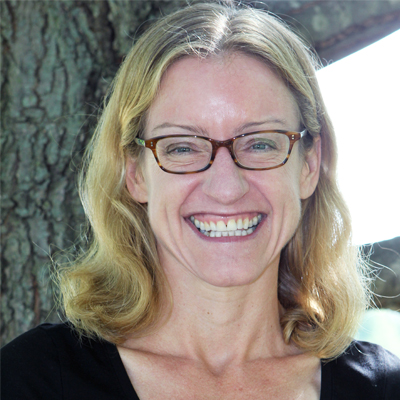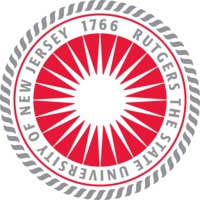Understanding the ecology of pollinators and putting research into practice through collaborations
Pollinators are required by 90% of flowering plants worldwide and 75% of crops, thereby playing a critical role in maintaining ecosystems and food security. Recent declines in bee pollinators have drawn national attention to the need for enhanced pollinator conservation, including a recent White House memorandum recommending creation of a federal strategy for improving the health of pollinators such as bees. Despite their importance and these efforts, however, most of the ~4000 species of bees that are native to the United States are poorly known scientifically. Dr. Rachael Winfree, Associate Professor of Ecology, Evolution and Natural Resources at Rutgers University, investigates basic scientific questions involving pollinators and pollination. She then collaborates with the government and conservation-oriented NGOs to translate this ecological knowledge into on-the-ground pollinator conservation.
The lack of basic ecological knowledge about our native pollinator species has led to a lack of policy protecting bees. For example, no state in the USA has completely evaluated and characterized its bee species as rare or endangered. Moreover, at the national level, it is likely that several bee species have gone extinct in recent times, but no bee species is even listed under the Endangered Species Act. A pioneer in pollinator research, Dr. Winfree is helping to fill this gap in knowledge by collecting field data on hundreds of bee species at statewide scales. Researchers from the Winfree lab investigate natural habitats, cities and agriculture to discover what habitats different species use and which species might be in need of protection. In this process there have been exciting surprises; for example, Dr. Winfree re-discovered a bee species that was thought to be extinct while doing field research in New Jersey, less than 50 miles from the American Museum of Natural History. Her research is thus invaluable to understanding and protecting the bee pollinators. To put the science from her lab into practice, Dr. Winfree collaborates closely with government agencies including the National Resource Conservation Service (NRCS) and New Jersey Department of Environmental Protection, and serves as a scientific advisor to international NGOs such as the Xerces Society for Invertebrate Conservation.
Current research includes:
- Global change, pollinator biodiversity, and pollination services: Human land use and climate change are causing both biodiversity loss and the degradation of ecosystem services. Dr. Winfree’s lab uses pollinators and pollination as a model system for understanding the relationships among global change, biodiversity, and ecosystem services. This field of science has largely been developed in small-scale experiments; the Winfree lab is now testing these ideas at the much larger spatial and temporal scales typical of real-world systems. For example, does the magnitude and reliability of crop pollination depend on the number of pollinator species present, or is pollination largely provided by a small subset of functionally important species? Are multiple bee species complementary to each other in providing pollination, or are they largely redundant? Dr. Winfree’s lab combines large-scale field work with mathematical modeling to investigate these questions.
- Plant-pollinator networks: The network of interactions among plants and their pollinators provides a powerful tool for investigating questions about mutualism in a changing world. How are plant-pollinator networks affected when species are lost due to human disturbance? How might networks change as the climate warms? Dr. Winfree’s lab explores these questions with both models and data, in systems ranging from deciduous forests in the eastern USA, to pollinator restoration planting on private lands, to rare montane plant communities along the Montana-Idaho border.
- Pollinator conservation and restoration: Dr. Winfree’s lab uses the data they collect on habitats used by pollinators, plant-pollinator relationships, and the functional importance of particular pollinator species to develop recommendations for state and federal agencies who implement pollinator conservation and restoration. A current research focus is determining whether both rare bee species and species that provide ecosystem services to crops can be restored via the same protocols. Dr. Winfree and her lab are also collaborating with the Department of Environmental Protection in the State of New Jersey to develop what will be the first comprehensive statewide list of rare bee species for any state in the USA. In this work, Dr. Winfree and her research group aim make a positive change in the world.

Bio
Dr. Rachael Winfree is an Associate Professor in the Department of Ecology, Evolution and Natural Resources at Rutgers University, New Brunswick. Her research interests include (1) how pollinators and the pollination services they provide are affected by global change, (2) the relationship between biodiversity and ecosystem services, and (3) pollinator conservation and restoration. Her work has been published in leading scientific journals including PNAS, Science, Ecology Letters, Ecology, and Proceedings of the Royal Society of London. Dr. Winfree’s research has also been featured in the popular media such as Nature (commentary), Audubon magazine, National Wildlife magazine, Science News, The Scientist, and National Public Radio (NPR). Dr. Winfree is a faculty member in ecology for F1000, an editor for Ecological Applications, and a scientific advisor to the Xerces Society.
In her own words, Dr. Winifree describes what drives her to continue in her line of research, “I am driven to understand how nature works, and I enjoy spending my time working with and thinking about the natural world. I am excited by ideas and by discovery, and I love the challenging intellectual environment that constitutes day-to-day life in the lab. As an advisor and lab head, it is satisfying to me to pass on the knowledge of science and its method to the next generation of researchers.”
Outside of her research, Dr. Winfree spends as much time as she can outdoors with her husband and two children. She often takes her eldest son to conferences and talks, where he gets to interact with scientists and graduate students. Dr. Winfree also enjoys running and is preparing for a half-marathon.
For more information, visit winfreelab.com

In the News
The Washington Post
National Wildlife
Audubon


